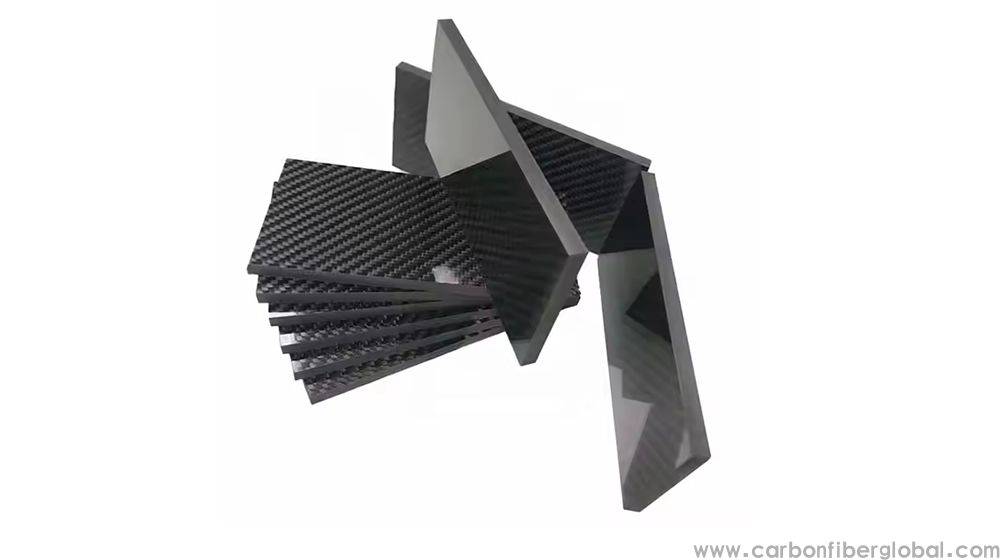Thick Carbon Fiber Sheets are a versatile and robust material used across various industries, offering exceptional strength, stiffness, and durability. These sheets are characterized by their higher thickness compared to standard Carbon Fiber materials, making them ideal for applications that require greater structural integrity and load-bearing capacity. In this article, we will explore what thick Carbon fiber sheets are, their benefits, and the different applications they serve.

What Are Thick carbon fiber sheets?
thick carbon fiber sheets are essentially carbon fiber laminates that are made by stacking multiple layers of carbon fiber fabric, impregnated with resin, to achieve a greater thickness. Unlike standard carbon fiber sheets, which are typically around 1mm to 2mm thick, thick carbon fiber sheets can range from 3mm to several centimeters in thickness.
The process of manufacturing thick carbon fiber sheets involves layering multiple sheets of carbon fiber fabric together and curing them under heat and pressure. The resulting sheet is highly durable and offers enhanced mechanical properties, making it suitable for demanding applications.
Properties of Thick Carbon Fiber Sheets
Thick carbon fiber sheets retain the inherent properties of standard carbon fiber but offer even more strength and resilience due to their increased thickness. Some of the notable properties include:
- High Strength-to-Weight Ratio: Despite being thicker, carbon fiber sheets remain lightweight compared to metals such as steel or aluminum, providing a high strength-to-weight ratio that is crucial for performance-driven applications.
- Increased Stiffness: The additional thickness of the sheets provides greater stiffness, allowing them to resist bending, twisting, or deformation under load.
- Impact Resistance: Thick carbon fiber sheets provide excellent resistance to impacts and shocks, making them suitable for high-stress environments.
- Corrosion Resistance: Like standard carbon fiber, thick carbon fiber sheets are highly resistant to corrosion, making them ideal for use in harsh environments such as marine or chemical industries.
- Thermal Stability: Thick carbon fiber sheets are capable of withstanding high temperatures, making them suitable for applications in extreme heat or cold conditions.
- Electrical Conductivity: Carbon fiber is conductive, making these sheets useful in applications requiring controlled electrical properties.
Applications of Thick Carbon Fiber Sheets
Thick carbon fiber sheets are used in a variety of industries where high strength, low weight, and durability are critical. Some common applications include:
Aerospace: Thick carbon fiber sheets are used in the aerospace industry for structural components such as bulkheads, wing spars, and fuselage panels. The combination of lightweight and high strength helps reduce the overall weight of aircraft, improving fuel efficiency and performance.
Automotive: In the automotive sector, thick carbon fiber sheets are utilized for creating lightweight and strong body panels, bumpers, hoods, and chassis components, especially in high-performance and racing vehicles. The increased thickness ensures better protection and impact resistance while maintaining a low overall weight.
Marine: The marine industry often employs thick carbon fiber sheets for building strong, lightweight boat hulls, decks, and other structural components. The material’s resistance to corrosion makes it ideal for use in saltwater environments.
Sports Equipment: High-performance sports gear, such as bicycles, golf clubs, ski poles, and snowboards, often incorporate thick carbon fiber sheets to provide strength and flexibility without compromising on weight.
Military and Defense: Due to their durability, thick carbon fiber sheets are used in the manufacturing of defense components such as armored vehicles, protective shields, and ballistic-resistant panels. The material’s ability to withstand impacts and high-stress conditions is critical for military applications.
Industrial Equipment: Thick carbon fiber sheets are also used in heavy machinery and industrial tools. Their Strength and durability allow them to withstand high loads and harsh conditions in factories or other industrial environments.
Construction: In the construction industry, thick carbon fiber sheets are used for reinforcement in structures, providing additional strength while maintaining a lightweight profile. They are often applied in bridges, buildings, and infrastructure projects that require high strength-to-weight ratios.
Benefits of Thick Carbon Fiber Sheets
- Enhanced Durability: Thick carbon fiber sheets are highly resistant to wear, impact, and environmental damage, ensuring that products made from them last longer and require less maintenance.
- Increased Load-Bearing Capacity: The added thickness results in better load-bearing capacity, which is especially beneficial in structural applications where safety and reliability are paramount.
- Weight Reduction: While thicker than standard carbon fiber sheets, they are still significantly lighter than metals, allowing for weight reductions in industries like aerospace and automotive without compromising strength.
- Design flexibility: The additional thickness of carbon fiber sheets provides greater flexibility in design, allowing engineers to create stronger and more complex components.
- Corrosion and Environmental Resistance: Thick carbon fiber sheets maintain their integrity and performance even in challenging environments, such as exposure to moisture, chemicals, or extreme temperatures.
How to Work with Thick Carbon Fiber Sheets
Working with thick carbon fiber sheets requires specialized tools and techniques. Some key considerations include:
- Cutting: Thick carbon fiber sheets should be cut using diamond-coated or carbide-tipped blades to prevent fraying and ensure clean edges. CNC machines or circular saws are ideal for making precise cuts.
- Drilling: When drilling holes in thick carbon fiber sheets, it’s essential to use sharp, high-quality drill bits designed for composite materials. Drilling should be done at slow speeds to prevent the material from chipping or cracking.
- Sanding and Finishing: Thick carbon fiber sheets can be sanded down to smooth the edges or achieve a specific finish. Wet sanding is recommended to minimize dust and prevent inhalation of harmful particles.
- Bonding: Adhesives used to bond thick carbon fiber sheets should be specifically designed for composite materials, ensuring a strong and durable bond.
Conclusion
Thick carbon fiber sheets are a vital material for industries requiring high strength, lightweight properties, and durability. From aerospace to automotive, marine, and defense applications, these sheets provide the ideal combination of performance and resilience. Their versatility, impact resistance, and corrosion resistance make them indispensable for demanding applications that require both strength and weight savings. Whether you are building advanced aerospace components, high-performance vehicles, or sports equipment, thick carbon fiber sheets provide the ideal solution for your needs.


